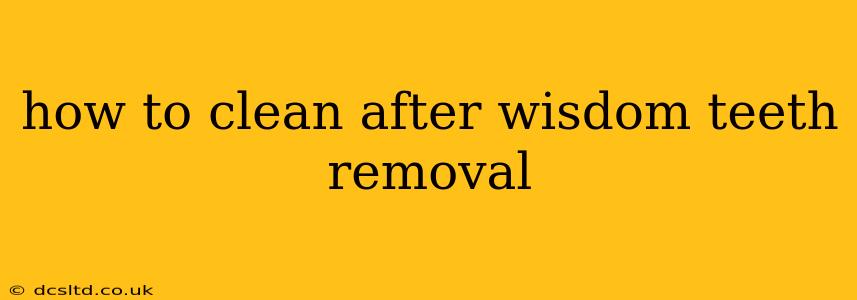Having your wisdom teeth removed is a significant oral surgery, and proper post-operative care is crucial for a speedy and complication-free recovery. This comprehensive guide details how to clean your mouth effectively after wisdom teeth extraction, addressing common concerns and ensuring a healthy healing process. Ignoring proper cleaning techniques can lead to dry socket, infection, or other complications.
What are the immediate post-operative instructions after wisdom teeth removal?
Immediately after your wisdom teeth extraction, your oral surgeon or dentist will provide specific instructions. These typically involve:
- Biting down on gauze: This helps control bleeding and forms a clot, essential for healing. Change the gauze as needed, following your dentist's instructions.
- Resting: Avoid strenuous activity for at least 24 hours.
- Ice packs: Applying ice packs to your face can reduce swelling and pain.
- Medication: Taking prescribed pain relievers and antibiotics (if prescribed) as directed is vital.
- Diet restrictions: Stick to a soft food diet for the first few days, avoiding anything that could dislodge the blood clot.
How should I clean my mouth after wisdom teeth extraction?
Gentle cleaning is paramount. Aggressive brushing or rinsing can dislodge the blood clot, leading to a painful condition called dry socket. Here’s a step-by-step guide:
-
Wait: Avoid rinsing or brushing near the extraction site for the first 24 hours. This allows the blood clot to form properly.
-
Saltwater rinse: After 24 hours, begin gently rinsing your mouth with warm saltwater (1/4 to 1/2 teaspoon of salt dissolved in 8 ounces of warm water). Do this several times a day, gently swishing the saltwater around your mouth, avoiding the extraction site directly. This helps to keep the area clean and reduces inflammation.
-
Soft-bristled toothbrush: Use a soft-bristled toothbrush to gently brush your teeth, avoiding the extraction sites. Focus on the areas that are easily accessible without disturbing the healing process.
-
Avoid aggressive brushing or flossing: Avoid aggressive brushing or flossing near the extraction sites for at least a week or until your dentist gives you the all-clear. Gentle cleaning is key to preventing complications.
-
Oral irrigator (Waterpik): Once your dentist approves, a low-pressure oral irrigator can be helpful in cleaning the area gently. Always follow the instructions provided by your dentist or oral surgeon.
How often should I rinse my mouth after wisdom teeth extraction?
Rinse your mouth with warm saltwater several times a day, usually 3-4 times, especially after meals. However, follow your dentist's specific recommendations, as this may vary depending on the complexity of the extraction and individual healing.
What foods should I avoid after wisdom teeth removal?
Avoid hard, crunchy, or sticky foods for at least a week or as advised by your dentist. These can dislodge the blood clot and delay healing. Examples include:
- Hard candies
- Popcorn
- Nuts
- Seeds
- Sticky sweets
When should I contact my dentist or oral surgeon after wisdom teeth extraction?
Contact your dentist or oral surgeon immediately if you experience:
- Excessive bleeding
- Severe pain
- Swelling that increases after the first 24-48 hours
- Signs of infection (fever, pus, redness)
- Dry socket (intense pain, visible empty socket)
What are the signs of a dry socket?
A dry socket is a painful condition that occurs when the blood clot at the extraction site is dislodged. Symptoms include:
- Intense, throbbing pain starting 2-5 days post-extraction.
- Visible empty socket.
- Bad breath or unpleasant taste.
How long does it take for wisdom teeth extraction sites to heal?
Healing time varies depending on individual factors and the complexity of the extraction, but typically takes several weeks to months for complete healing. The extraction site should be mostly closed within 2-3 weeks, but bone regeneration takes longer.
By following these guidelines and maintaining excellent oral hygiene, you can significantly reduce the risk of complications and promote healthy healing after wisdom teeth removal. Remember, always follow your dentist or oral surgeon's specific instructions, as they are best equipped to provide personalized care for your unique situation.
